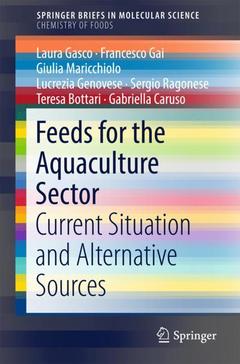Feeds for the Aquaculture Sector, 1st ed. 2018 Current Situation and Alternative Sources Chemistry of Foods Series
Auteurs : Gasco Laura, Gai Francesco, Maricchiolo Giulia, Genovese Lucrezia, Ragonese Sergio, Bottari Teresa, Caruso Gabriella

This Brief discusses potential alternative sources for feeds in aquaculture fish diet, and explains that the future of aquaculture?s development is dependent on the costs of fishmeal and fish oil. Considering that the increasing costs of traditional feeds constrain this development, research is looking into alternatives, which can ensure adequate nutrition for animals? growth.
This work reviews the use of alternative plant, microbial and insect protein sources, evaluating in particular their impact on growth, nutrient digestibility, fillet quality traits and sensorial perception in the most important farmed marine and freshwater fish species. The Brief specifically summarizes the pros and cons of plant oils from oilseeds, which can on the one hand be a sustainable substitute for fish oil, but which are on the other hand less rich in omega-3 long-chain polyunsaturated fatty acids. The feeding might therefore result in an undesired reduced nutritional value of the flesh of farmed fish. The authors also explore the possible use of fishery discards as potential aquaculture feed source. Since the landing of by-catch will with the new Common Fisheries Policy (CFP) become obligatory (instead of simply returning it to the sea, often dead), suitable uses of what must not be used for human consumption can be investigated. The authors give an outlook whether this might become a sensible alternative to improve the management of discards and create more sustainable fisheries.
The Brief also addresses the issues of additives to aquafeeds, such as vitamins, minerals, and antioxidants, but also immunostimulants and enzymes. The authors discuss which effects these additives may have on fish growth, welfare, reproduction and health status in aquacultures.
Fish Meal Alternative Protein Sources for Aquaculture Feeds.- Fishery Discards as a Source of Food for Reared or Wild Fish? The Bottom Trawling in the Mediterranean Sea as a Case Study.- Sustainable Alternative for Dietary Fish Oil in Aquafeeds: Current Situation and Future Perspectives.- Supplementation of Vitamins, Minerals, Enzymes and Antioxidants in Fish feeds.
Laura Gasco is an Associate Professor at the Department of Agricultural, Forest and Food Sciences (DISAFA) of the University of Turin (Italy), and her main research is focused on fish, rabbits and poultry nutrition. Graduated as an agricultural engineer at the Université catholique de Louvain (UCL), Belgium (1992), Laura Gasco moved to Ireland to obtain a Diploma in Business Administration (University of Limerick), and then to the University of Turin where she became PhD in Animal Sciences, and researcher (1999). Since 2012, Laura Gasco is involved in trials on insects as feed for fish and poultry in collaboration with Italian and international research groups.
Francesco Gai is a permanent researcher at the Institute of Sciences of Food Production, National Research Council, Grugliasco, Italy, where he studies the animal nutrition of monogastric species with a special focus on aquaculture. Francesco Gai obtained his PhD degree in Animal Productions (2006) at the University of Turin, Italy, and since 2012, he is involved in experimental projects on the utilization of insects for feed purposes, in partnership with different European research groups.
Giulia Maricchiolo obtained her PhD degree in Anatomy of Fish species and Birds at the Faculty of Veterinary of University of Messina (Italy), and she is a permanent researcher at the Institute for Coastal Marine Environment (IAMC) of the National Research Council, Messina (CNR, Italy). Giulia Maricchiolo is responsible for the Aquaculture facility of IAMC-CNR – a structure authorised for Animal experimentation (in accordance with the Legislative Decree No 26/2014) by the Italian Ministry of Health, and for the Animal Welfare structure of the IAMC-CNR. She is also President of the Organism Responsible for Animal Welfare in the same institution.
Lucrezia Genovese is currently a Senior Scientist of the Institute for Coastal Marine Environment (IAMC) of the National Research C
Discusses alternative resources for aquaculture feeds, including plant oils and the possible reuse of fishery discards
Considers consequences on the nutritional value of the flesh from farmed fish
Introduces additives to aquafeeds, addressing advantages and disadvantages
Date de parution : 04-2018
Ouvrage de 103 p.
15.5x23.5 cm
Disponible chez l'éditeur (délai d'approvisionnement : 15 jours).
Prix indicatif 52,74 €
Ajouter au panier